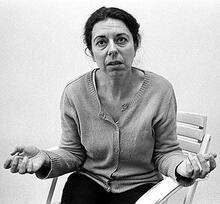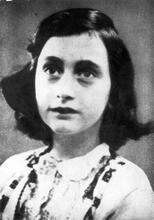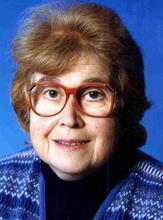Katja Behrens
Katja Behrens in 2012,
Courtesy of Manfred Sause/Wikimedia Commons.
Part of the first generation of postwar writers in Germany, Katja Behrens grappled with the relationship between German Jews and the German majority. Behrens survived the Holocaust by hiding in the house of a Catholic priest with her mother and grandmother. In 1960 she began translating books from English to German and in 1978 she published her first collection of short stories, Die Weiße Frau (The White Woman), followed by numerous novels, short story collections, and essays. Behrens wrote about the Holocaust and her Jewish identity in her lyric fiction and in her essays. She used her own experience to advocate for other marginalized groups in Germany, including immigrants. Alongside her writing, Behrens wrote and directed television documentaries.
In “Liebe” (Love) the opening story in her first published work, Die Weiße Frau (The White Woman, stories, 1978), Katja Behrens wrote:
The memory comes and goes. Sometimes, when I’m thinking about something quite different, it suddenly returns, and try as I may to shake it off, there’s nothing I can do about it. And then again, when I’m like a stone for days on end and would prefer to bear the pain, it disappears: I’ve forgotten everything and the door is closed (17).
Is memory an animal, which can cast off its skin like a chameleon? This could be one of the questions about Behrens’s writing.
Family and Personal Life
Behrens was born in Berlin on December 18, 1942. Her mother, Leni Oswald (1910–1985), was an author and a journalist. Her father, Josef Oswald (1901–1977), worked as a photographer. Both parents were born and lived in Berlin. Her maternal Jewish grandmother was born in Lemberg (Galicia) and grew up in Wiesbaden. From 1943 to 1945 her mother and grandmother took her into hiding at the house of a Catholic priest in Schwarzenberg (Austria). After the war they returned to Germany. Behrens attended high school, married Peter Behrens in 1960, gave birth to her daughter Natascha, and divorced in 1971. In 1960 she began working as a freelance translator, especially of fiction. Among the twenty novels she translated are works by William S. Burroughs, Henry Miller, Kenneth Patchen, and Tessa Bridal. Between 1973 and 1978 she worked as a reader for the publishing house Luchterhand-Verlag in Darmstadt. She traveled extensively, visiting India, Sri Lanka, North Africa, the United States, and South America. From 1968 until 1970 she lived in Israel.
Prizes and Honors
Behrens, who was a member of the Verband deutscher Schriftsteller (Association of German Authors) beginning in 1971, was also a member of the German PEN Center. She was a visiting professor at Washington University in St. Louis (1986) and at Dartmouth College, Hanover (New Hampshire) (1991).
Behrens won many prizes, including the Förderpreis (Promotion Prize) of the Ingeborg Bachmann Prize (1978); the Märkisches Stipendium für Literatur (1978); the Thaddäus Troll Prize (1981); Villa Massimo Stipendium at Olevano (1986); the Stadtschreiber (City Writers) Prize of the ZDF and the city of Mainz (1992); the Arnim Scholarship of the Artists’ House at Wiepersdorf Castle (1996); and the Lo Stellato, Premio Internazionale di Narrativa Salerno (2000), Literaturpreis der Stadt Wiesbaden (Literature Prize of the city of Wiesbaden, 2002); Kinder- und Jugendbuchpreis Luchs (Children and Youthbook-Prize Luchs, 2002; and the Ehrengabe der Deutschen Schiller-Stiftung (2003).
Like Esther Dischereit, Barbara Honigmann, Helena Janeczek (b. 1964) and Gila Lustiger (b. 1963), Katja Behrens was one of more than thirty-five post-Holocaust generation writers of Jewish literature in German who appeared on the literary scene after the late 1970s and whose work was named “Young Jewish Literature” (Thomas Nolden).
Behrens was an exponent of the so-called “German-Jewish Literature of the Nineties,” the title both of an international symposium held in Berlin (Wannsee) in November 2000 and of a publication edited by Sander L. Gilman (University of Illinois, Chicago) and Hartmut Steinecke (University of Paderborn). A first survey of these writers, the latter gives an elaborate bibliography, which resulted from a research project conducted by Steinecke and Gilman on the establishment of the Deutsch-Amerikanisches Akademisches Konzil (German-American Academic Council, Bonn/Washington) in the framework of the TransCoop-Program established in 1994.
Literary Themes and Jewish Storytelling
Behrens’s stories are like journeys through interiors. Her Jewish stories, Salomo und die anderen—Jüdische Geschichten (Salomo and the Others—Jewish Stories, 1993), are about survivors of the Holocaust. In scenes of great disquiet and illuminated precision she delineates the well-observed social situation in present-day Germany. A subtitle such as “Jewish stories” marks the distinction between Behrens and other authors of the post-Holocaust generation: few of them—with the most remarkable exception of Esther Dischereit’s Joëmis Tisch. Eine Jüdische Geschichte (Joëmi’s Table: A Jewish Story, 1988) and Übungen, jüdisch zu sein (Exercises in Being Jewish, 1998)—explicitly refer to their storytelling as Jewish. Her writing scrutinizes the vital issue of her Jewish identity. In 1999 Behrens published an article in Die Zeit entitled “Zu Hause in der Fremde. Juden mögen sich deutsch fühlen. Für Deutsche bleiben sie immer nur Juden. Nachruf auf eine Illusion” (At Home Abroad. Jews may feel German. For the Germans, they always remain just Jews. Obituary of an illusion). This is a radical deconstruction of the issue on which Behrens further elaborated in her speech “The Rift and Not the Symbiosis” at a conference on The Changing German-Jewish Symbiosis 1945–2000, held at the Weisman Art Museum, Minneapolis, in 2000. Thus Behrens destroyed the “myth” of the German-Jewish dialogue or “symbiosis,” as Gershom Scholem called it (Scholem, 1970).
Early on, Behrens began an inner dialogue with herself, which found expression in the very title of her 2000 publication: Ich bin geblieben—warum? Juden in Deutschland heute (I stayed—why? Jews in Germany today). One of her various topoi seemed to be a kind of internal emigration, a point of view to which she gave expression in her essay Nach innen ausgewandert (Emigrated inwards), first published in the Frankfurter Allgemeine Zeitung in 1981. This essay illustrates the difficult balance between assimilation on the one hand and, on the other, the feeling of pride in one’s Jewish origins.
Critical Acclaim and Legacy
Behrens edited a number of works: Chilenische Erzählungen (Chilean Stories, 1977), Frauenbriefe der Romantik (Letters by Women of the Romantic Period, 1981), Das Insel-Buch vom Lob der Frau (The Insel-Book in Praise of Women, 1982) and Abschiedsbriefe (Farewell Letters, 1987), which included an essay of her own. Behrens darted easily between different genres, working as a writer, editor, director and script writer of television documentary shows. Her novel Die dreizehnte Fee (The Thirteenth Fairy, 1983), a Jewish narrative, was acclaimed by critics as “an amazing book … by someone who knows how to tell a story artfully, but with a spare artfulness.” Its autobiographical stream-of-consciousness form stems from its constellation of characters—three generations of women who live in the same house, comprising the child Anna, her mother Hanna, and her Jewish grandmother, Marie Mandelbaum. This becomes the framework for story-telling as a family chronicle, in which Behrens creates a kaleidoscope of lost or hidden memories. The same is true of her well-received novel, Die Vagantin (The Travelling Musicians, 1997). Behrens also wrote children’s books such as Zorro—Im Jahr des Pferdes (Zorro––In the Year of the Horse, 1999), essays, and political statements such as Weiches Wasser bricht den Stein. Widerstandsreden (Soft Water Breaks the Stone: Resistance Speeches, 1984). She participated in demonstrations against xenophobia, for example in Darmstadt in 1992, where she delivered a speech entitled “Nicht zusehen” (Looking the Other Way). On political issues, such as foreigners in Germany, Behrens was involved as both a Jew and a German. There was a close connection between her female perspective and her Jewish origin. Indeed, Behrens had several identities: she was a divorced Jewish woman and a single mother who had to educate her child. However, Behrens never saw her writing as feminist praxis.
Behrens’s various works also include a CD production of Briefe der Romantik (Letters of the Romantic Period, 1999)—the historical period which seemed most to appeal to her—and the production of a television documentary, Jerusalem–Berlin, for which she wrote the script as well as serving as its director. The title of this documentary serves as a kind of summary of Behrens’ thinking, writing, and living: tracing the path back to the past. Memory becomes a palimpsest, like a map of different countries, continents, and cultures. Travelling across this terrain involves a kind of erratic monologue by the author, as in her story “Gringa, oder die Weiße Frau” (Gringa, or The White Woman). The title Jerusalem–Berlin is of course reminiscent of Gershom Scholem’s autobiography, From Berlin to Jerusalem: Memories of My Youth (1980). In her novel Hathaway Jones (2002), Behrens told a subtle love story in pure poetical language.
Behrens opened a field of vision of two totally different cultural and religious spaces, each with its traditions, rituals, and festivals. At the same time, her work relates to various patterns of sensual perception and modes of thought.
Katja Behrens died on March 6, 2021, in Darmstadt, Germany.
Selected Works by Katja Behrens
For a complete bibliography of Behrens’s work, see Uta Schwarz: “Katja Behrens.” In Kritisches Lexikon zur deutschsprachigen Gegenwartsliteratur, 70. Nlg. 3 (2002) (the magazine’s website is located at http://www.klgonline.de).
Katja Behrens’s official website, http://www.katja-behrens.de.
Die weiße Frau. Erzählungen. Frankfurt/Main: 1978 (Neuausgaben Frankfurt/Main 1981; 1984; 1994).
Den vita kvinnan, Stockholm: 1980; Jonas. Erzählungen. Pfaffenweiler 1981.
Die dreizehnte Fee. Roman. Düsseldorf: 1983 (Neuausgabe Frankfurt/Main 1994).
De dertiende fee, Utrecht: 1985.
Den trettonde feen, Stockholm 1985.
La treizième fée, Paris: 1987.
Von einem Ort zum andern. Erzählungen. Pfaffenweiler: 1987.
Im Wasser tanzen. Ein Erzählzyklus. Frankfurt/Main: 1990 (Neuausgabe 1993); Salomo und die anderen. Jüdische Geschichten. Erzählungen. Frankfurt/Main: 1993 (Neuausgabe 1995).
Leitfaden zum Hanfanbau in Haus, Hof und Garten. Frankfurt/Main: 199.
Die Vagantin. Roman. Frankfurt/Main: 1997.
Zorro—Im Jahr des Pferdes. Roman. Weinheim: 1999.
Helen Keller. Biografie. Weinheim: 2001.
Hathaway Jones. Roman. Weinheim: 2002.
Editing
Chilenische Erzählungen, edited by Katja Behrens. Darmstadt, Neuwied: 1977.
Das 3. Jahr. Zusammen mit Sigrid Dietz, Rudolf Habetin et. al. Hagen: 1979.
Frauenbriefe der Romantik, edited by and with an epilogue of Katja Behrens. Frankfurt/Main: 1981 (Neuausgabe unter dem Titel Frauen der Romantik. Porträts in Briefen. Frankfurt/Main, Leipzig: 1995).
Das Insel-Buch vom Lob der Frau. Ausgewählt von Katja Behrens. Frankfurt/Main: 1982.
Weiches Wasser bricht den Stein. Widerstandsreden, edited by Katja Behrens. Frankfurt/Main: 1984.
Abschiedsbriefe, edited by and with an essay of Katja Behrens. Düsseldorf: 1987 (Neuausgabe Frankfurt/Main: 1995).
Die schönsten Pferdegeschichten, edited by Katja Behrens. Frankfurt/Main, Leipzig: 1992 (Neuausgabe unter dem Titel Pferdegeschichten. Frankfurt/Main, Leipzig: 1995).
Ich bin geblieben—warum? Juden in Deutschland—heute, edited by Katja Behrens. Gerlingen: 2002.
Essays in foreign anthologies: English, French, Japan, Hungarian, Spanish, Italian, Hebrew, Russian and Catalan.
Translations
Burroughs, William S. The Naked Lunch. Aus dem Amerikanischen zusammen mit Peter Behrens. Wiesbaden: 1962.
Burroughs, William S. Junkie. Bekenntnisse eines unbelehrten Rauschgiftsüchtigen. Wiesbaden: 1963.
Burroughs, William S., Ginsberg, Allen. Auf der Suche nach Yage. Ein Briefwechsel. Aus dem Amerikanischen zusammen mit Peter Behrens. Wiesbaden: 1964.
Patchen, Kenneth. Erinnerungen eines schüchternen Photographen. Wiesbaden: 1964.
Miller, Henry. Mein Leben und meine Welt. Vorwort von Bradley Smith. München: 1972.
Miller, Henry. Insomnia oder Die schönen Torheiten des Alters. Frankfurt/Main: 1975.
Bridal, Tessa. Der Baum der roten Sterne. Berlin: 1998.
Stories
“Adolf.” In Die Palette. Zeitschrift für Literatur von Randgruppen. Themenheft: 50 Jahre danach—Jüdische Autoren schreiben. 9:18 (Herbst: 1993), 9–10.
“Verführung.” In Kopflauf. Darmstädter Anthologie, edited by Fritz Deppert, Klaus F. Schmidt-Mâcon und Rainer Witt. Frankfurt/Main: 1990, 191–195.
Essays, Feuilletons, Criticism, Miscellaneous Texts
“Nach innen ausgewandert.” In Der Hunger nach Erfahrung. Frauen nach 1945, edited by Inge Stolten. Berlin, Bonn 1981.
“‘Nicht zusehen.’ Rede auf einer Großdemonstration in Darmstadt gegen Ausländerfeindlichkeit.” In Rhein-Zeitung (Mainz), November 9, 1992.
“Zu Hause in der Fremde. Juden mögen sich deutsch fühlen. Für Deutsche bleiben sie immer nur Juden. Nachruf auf eine Illusion.” In Die Zeit, August 26, 1999. Alles Sehen kommt von der Seele. Die Lebensgeschichte der Helen Keller. Weinheim: 2001.
The Rift and not the Symbiosis. In Unlikely History: The Changing German-Jewish Symbiosis 1945–2000, edited by Leslie Morris and Jack Zipes. New York: 2000, 31–45.
Radio Plays
Leo. Westdeutscher Rundfunk, 23.2.1986.
Josef geht. Westdeutscher Rundfunk, 10.6.1990.
Der Regen. Süddeutscher Rundfunk, 9.8.1990.
Der Regen. Ein Monodrama. Südwest Rundfunk, 26.8.1990.
Dorfleben oder Das kleine Fressen. Westdeutscher Rundfunk, 10./11.11.1991.
Television-Documentary
Jerusalem–Berlin. TV-Dokumentation. Drehbuch und Regie: Katja Behrens, ZDF, 7.3.1993.
Cassettes/CDs
Briefe der Romantik. “Sooft ich Deiner gedenke, geh’n mir tausend Herzen auf.” Four cassettes. Belteshausen: 1999.
Bibliography
Deutsch-jüdische Literatur der neunziger Jahre. Die Generation nach der Shoah. Beiträge des internationalen Symposions, November 26–29, 2000, im Literarischen Colloquium Berlin-Wannsee, edited by Sander L. Gilman, and Hartmut Steinecke. Berlin: 2002 (Beihefte zur Zeitschrift für deutsche Philologie; 11).
Fiero, Petra S. “Bis zur Vergasung: Katja Behrens’ Kritik an der deutschen Sprache und Vergangenheitsbewältigung.” In Germanic Notes and Reviews 30:1 (Spring 1999): 143–152.
Jung, Werner. “Das Geschehen und das Schweigen. Katja Behrens: ‘Salomo und die anderen.’ Jüdische Geschichten.” Neue deutsche Literatur 41:10 (1993): 149–151.
Ladenthin, Volker. “Zwischen Identifikation und Fremdheit. Geschichten aus der Geschichte.” Neue deutsche Literatur 46: 518 (1998): 197–200.
Lorenz, Dagmar C. G. “Jewish Mothers and Daughters in Unified Germany (Katja Behrens).” In Keepers of the Motherland: German Texts by Jewish Women Writers, edited by Dagmar C. G. Lorenz, 310–317. Lincoln, London: 1997, 310–317.
Nolden, Thomas. Junge jüdische Literatur. Konzentrisches Schreiben in der Gegenwart. Würzburg: 1995.
Reichart, Manuela. “‘Jonas’ von Katja Behrens.” In Die Zeit, 5.3.1982.
Renneke, Petra. “Bibliographie zur deutsch-jüdischen Literatur besonders der ‘Generation nach der Shoah.’” In Deutsch-jüdische Literatur der neunziger Jahre, 237–263.
Schnelle, Cornelia. “Behrens, Katja.” In Metzler-Lexikon der deutsch-jüdischen Literatur. Jüdische Autorinnen und Autoren deutscher Sprache von der Aufklärung bis zur Gegenwart, edited by Andreas B. Kilcher. Stuttgart: 2000, 47–48 (Neuausgabe Frankfurt/Main: 2003).
Scholem, Gershom. “Wider den Mythos vom deutsch jüdischen Gespräch.” In Gershom Scholem: Judaica 2. Frankfurt/Main: 1970.
Ueding, Gert. “Frostige Prosa. Zwei Erzählungen von Katja Behrens.” In Frankfurter Allgemeine Zeitung, 28.8.1981.
Werth, Wolfgang. “Triptychon der Einsamkeit. Zu den Erzählungen von Katja Behrens.” In Süddeutsche Zeitung, 3.2.1979.
Zeller, Michael. “Den Traum alleine tragen. Erzählungen von Katja Behrens.” In Frankfurter Allgemeine Zeitung, 6.1.1979.
Deutsch-jüdische Literatur der neunziger Jahre. Die Generation nach der Shoah. Beiträge des internationalen Symposions, November 26–29, 2000, im Literarischen Colloquium Berlin-Wannsee, edited by Sander L. Gilman, and Hartmut Steinecke. Berlin: 2002 (Beihefte zur Zeitschrift für deutsche Philologie.
11).
Fiero, Petra S. “Bis zur Vergasung: Katja Behrens’ Kritik an der deutschen Sprache und Vergangenheitsbewältigung.” In Germanic Notes and Reviews 30:1 (Spring 1999): 143–152.
Jung, Werner. “Das Geschehen und das Schweigen. Katja Behrens: ‘Salomo und die anderen.’ Jüdische Geschichten.” Neue deutsche Literatur 41:10 (1993): 149–151.
Ladenthin, Volker. “Zwischen Identifikation und Fremdheit. Geschichten aus der Geschichte.” Neue deutsche Literatur 46: 518 (1998): 197–200.
Lorenz, Dagmar C. G. “Jewish Mothers and Daughters in Unified Germany (Katja Behrens).” In Keepers of the Motherland: German Texts by Jewish Women Writers, edited by Dagmar C. G. Lorenz, 310–317. Lincoln, London: 1997, 310–317.
Nolden, Thomas. Junge jüdische Literatur. Konzentrisches Schreiben in der Gegenwart. Würzburg: 1995.
Reichart, Manuela. “‘Jonas’ von Katja Behrens.” In Die Zeit, 5.3.1982.
Renneke, Petra. “Bibliographie zur deutsch-jüdischen Literatur besonders der ‘Generation nach der Shoah.’” In Deutsch-jüdische Literatur der neunziger Jahre, 237–263.
Schnelle, Cornelia. “Behrens, Katja.” In Metzler-Lexikon der deutsch-jüdischen Literatur. Jüdische Autorinnen und Autoren deutscher Sprache von der Aufklärung bis zur Gegenwart, edited by Andreas B. Kilcher. Stuttgart: 2000, 47–48 (Neuausgabe Frankfurt/Main: 2003).
Scholem, Gershom. “Wider den Mythos vom deutsch jüdischen Gespräch.” In Gershom Scholem: Judaica 2. Frankfurt/Main: 1970.
Ueding, Gert. “Frostige Prosa. Zwei Erzählungen von Katja Behrens.” In Frankfurter Allgemeine Zeitung, 28.8.1981.
Werth, Wolfgang. “Triptychon der Einsamkeit. Zu den Erzählungen von Katja Behrens.” In Süddeutsche Zeitung, 3.2.1979.
Zeller, Michael. “Den Traum alleine tragen. Erzählungen von Katja Behrens.” In Frankfurter Allgemeine Zeitung, 6.1.1979.













